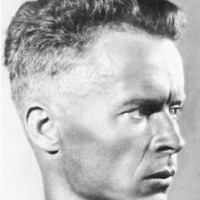Aleksandr Dovženko
- 25.11.1956

He was born in a family of peasants, but his illiterate grandfather encouraged him to get an education and in 1914 Dovženko graduated from the teaching University in Kiev. He worked as a teacher in an elementary school while studying at the Kiev University (1917- 1918) and afterwards at the Academy of Applied Arts in 1919 also in Kiev. After the Revolution in 1917 the Communist government seized the power and in early 1920s Dovzhenko joined the Communist party. After the war in 1920 he accepted a diplomatic position and worked as the ambassador’s assistant in Warsaw and Berlin. He returned to Kiev in 1923 and worked as a book illustrator and draughtsman of animated films. In 1926 he started to work in the film studio in Odessa. His first films were short comedies: Reformator Vasja (1926) and Plod ljubavi (Jagodki ljubavi, 1926) and the medium-length film spy film Diplomatic Pouch (Sumka dipkuryera, 1927). His first feature film was Zvenigora (1928) and in it he combines folklore elements with contemporary political topics and portrays life in rural Ukraine. He made his next three films, called the “Ukrainian trilogy”, in a similar way: Arsenal (1929) that portrays war in Ukraine, Zemlja (1930), which the Soviet critics proclaimed as contra-revolutionary and Ivan (1932), his first sound film that was attacked by the Soviet government for portraying the human suffering caused by industrialization. Aerograd (1935) was better accepted because it defended the government’s plan to develop east Siberia. In his film Shchors (1939) he portrayed the revolutionary activities of the Ukrainian intellectual, Nikolaj Shchors. During WW II, in which he did not fight due to his heart problems, Dovzhenko made documentaries and worked as a war reporter for the Red Army. His first post war film Michurin (1948) was Ivan Michurin’s biography, a horticultural expert who helped develop soviet agriculture. After WW II, disappointed in the bureaucracy of Stalin’s government that he felt restrained him from making many of his films, he started writing novels. He died of a heart attack just before shooting his film Poem of the Sea. In 1958, his wife, Russian actress Yuliya Solntseva, finished the film. She produced and directed several other films that Dovzhenko had not had a chance to finish: the documentary Battle For Soviet Ukraine (1961) and feature films Chronicle of The Years of Fire (Povest plamennikh let, 1961), Zacharovannaya desna (1964), The Unforgettable (Nezabyvayemoye, 1967). In 1949 Dovzhenko started his film Farewell, America but its filming was stopped in 1951, and the restored version was published in 1995.
Filmography
Farewell, America (1949-1951 / 1995)
Michurin (1948)
Shchors (1939) (co-director)
Aerograd (1935)
Ivan (1932)
The Earth (1930)
Arsenal (1928)
Zvenigora (1928)
Diplomatic Pouch (Sumka dipkur'era, 1927) (medium length film)
Vasya, the Reformer (Vasja reformator, 1926) (short film)
Love Berry (Jagodki ljubvi, 1926) (short film)